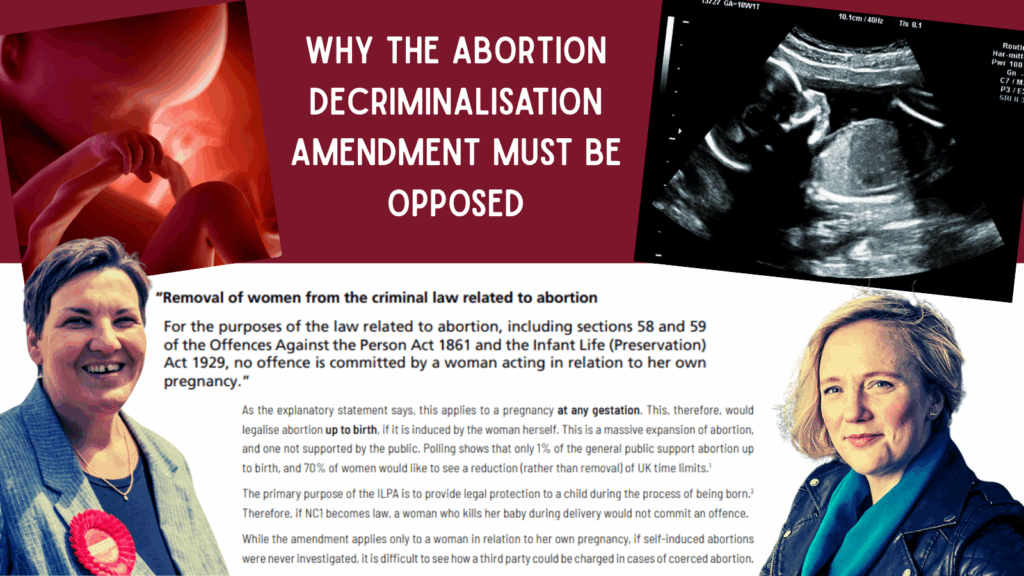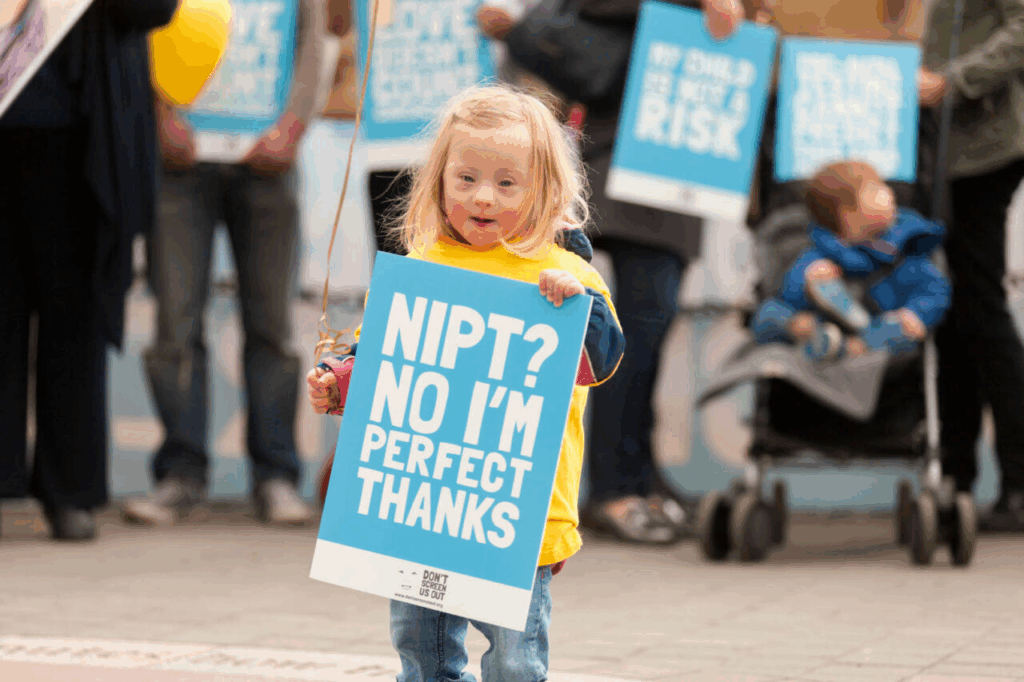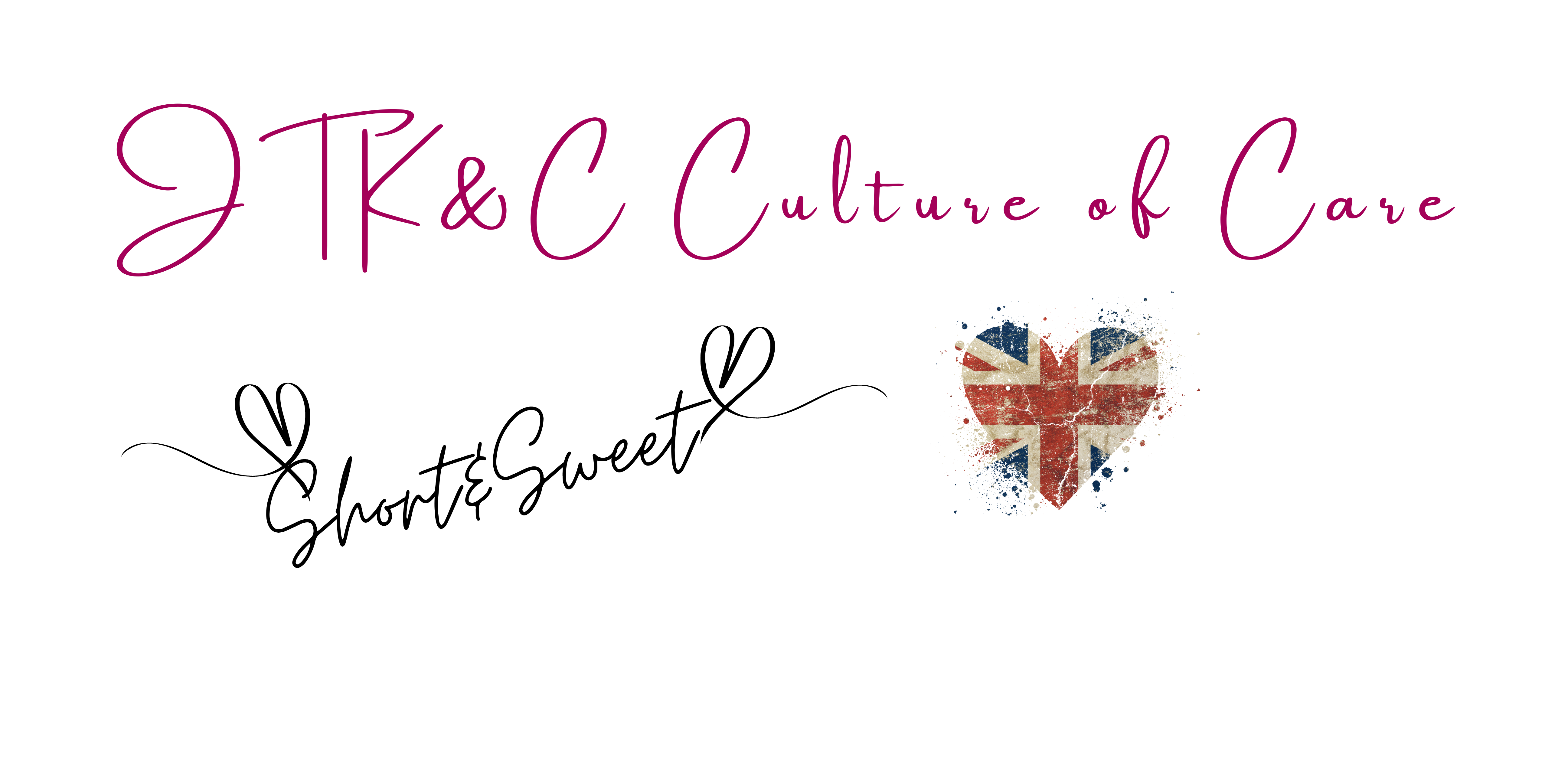The proposed amendment to decriminalise abortion in England and Wales, tabled by Labour MP Tonia Antoniazzi, and MP Stella Creasy represents a significant shift in the legal framework governing abortion. Supported by over 80 MPs as of May 2025, the amendment seeks to remove criminal penalties for women who procure abortions at any stage of pregnancy under the Offences Against the Person Act 1861 and the Infant Life (Preservation) Act 1929. This change, if passed, could have profound implications for unborn children, vulnerable women, and society’s approach to life-affirming values. This article outlines the reasons to oppose this amendment, provides a historical context of abortion in the UK, addresses concerns about full-term terminations, and offers actionable steps for individuals to engage in this critical issue.

The Importance of Opposing the Decriminalisation Amendment
The amendment, part of the government’s Crime and Policing Bill, aims to remove criminal liability for women who end their pregnancies outside the current legal framework, which permits abortions up to 24 weeks under the Abortion Act 1967, or later in cases of severe foetal impairment or risk to the mother’s life. While proponents argue it protects women from prosecution, the amendment effectively allows abortions up to birth in any circumstance, stripping away protections for unborn children and potentially increasing risks for women.
New Clause 1, tabled by Tonia Antoniazzi MP, seeks to change criminal law so that “no offence is committed by a woman acting in relation to her own pregnancy” at any gestation. This means that a woman who induced her abortion at home using pills (or any other method) at any stage of pregnancy, including just before natural birth, would not commit a crime.

New Clause 20, tabled by Stella Creasy MP, is even more extreme. It completely repeals the laws that form the legal underpinning of the current abortion law, meaning that there’d be no way to bring an abusive partner who causes the death of an unborn baby to justice.

The Society for the Protection of Unborn Children (SPUC), amongst others warn that decriminalisation could exacerbate the issue of coerced abortions, where women are pressured by partners, family, or societal circumstances into terminating pregnancies against their will. A BBC poll found that 15% of British women reported being coerced into abortions they did not want, highlighting the prevalence of this issue. Decriminalisation risks enabling abusers to obtain abortion pills under false pretences, as evidenced by a 2023 investigation led by Kevin Duffy, which exposed vulnerabilities in the “pills-by-post” scheme introduced during the COVID-19 pandemic. This scheme allows women to access abortion drugs via telemedicine, increasing the potential for misuse without proper oversight.
Moreover, decriminalisation could undermine the ethical balance established by the Abortion Act 1967, which requires two doctors to approve abortions based on specific criteria. Removing these safeguards may lead to a rise in late-term abortions, which are often more physically and emotionally traumatic for women and raise profound ethical questions about the rights of viable foetuses. The amendment’s proponents claim it aligns with human rights, but critics argue it prioritises individual autonomy over the sanctity of life, potentially further normalising abortion as a routine procedure rather than a serious medical decision.

A Brief History of Abortion in the UK
Abortion in the UK has been shaped by a complex interplay of legal, social, and medical developments. Prior to 1967, abortion was illegal under the Offences Against the Person Act 1861, with a maximum penalty of life imprisonment for women or providers who procured abortions outside limited circumstances. The Abortion Act 1967, introduced by MP David Steel, legalised abortion in England, Wales, and Scotland up to 28 weeks (later reduced to 24 weeks in 1990) when two doctors certify that continuing the pregnancy poses a greater risk to the woman’s physical or mental health than termination. Exceptions allow abortions after 24 weeks for severe foetal abnormalities or significant risks to the mother’s life.
On 14 March 2019, Steel was suspended by the Liberal Democrats after an admission that discussions he had conducted in 1979 with the then Liberal MP for Rochdale Cyril Smith, at a time when Steel was leader of the Liberal Party, had led him to conclude that Smith had been a sexual abuser of children in the 1960s and that Steel nonetheless failed to instigate any assessment by the party of whether Smith was an on-going risk to children.
Since 1967, approximately 10 million abortions have been performed in the UK, with around 200,000 annually in England and Wales alone. The introduction of telemedicine in 2020, allowing “pills-by-post” for early medical abortions, marked a significant change, reducing barriers but raising concerns about coercion and safety. Northern Ireland’s abortion laws were liberalised in 2019, decriminalising abortion up to 12 weeks and later under specific conditions, aligning it closer to Great Britain’s framework.
Efforts to decriminalise abortion have gained momentum in recent years. In 2017, the British Medical Association and Royal College of Obstetricians and Gynaecologists supported decriminalisation, followed by the Royal College of Nursing in 2018. In 2024, Labour MP Diana Johnson proposed a similar amendment, which lapsed due to the general election. The current amendment by Tonia Antoniazzi builds on these efforts, reflecting a broader push to treat abortion solely as a healthcare issue rather than a criminal one. However, several groups argue that this shift risks eroding protections for both women and unborn children.
Decriminalise Abortion Petition
A petition has been signed by 103,653 people wishing to removes safeguards to abortion https://petition.parliament.uk/petitions/700014 Parliament will debate this petition on 2 June 2025. You’ll be able to watch online on the UK Parliament YouTube channel.
The Government responded on 23 December 2024
All women have a right to access to safe, legal abortions on the NHS both in a medical setting and at home, where eligible. In England and Wales, the Abortion Act 1967 defines the criteria under which legal terminations can take place. The criminal law in relation to procuring an abortion is contained in the Offences Against the Person Act 1861, in particular sections 58 and 59. At this moment the Government has no plans to make changes to these Acts. Ministry of Justice

Issues Surrounding Full-Term Termination for Babies with Down Syndrome
One of the most contentious aspects of the decriminalisation debate is its potential impact on abortions performed due to foetal abnormalities, particularly Down syndrome. Under current law, abortions are permitted after 24 weeks if there is a “substantial risk” of the child being born with a serious disability, a provision that has led to a high rate of terminations for Down syndrome diagnoses. In England and Wales, around 90% of foetuses diagnosed with Down syndrome are aborted, often late in pregnancy when the foetus is viable outside the womb.
Decriminalisation could remove existing gestational limits, potentially increasing late-term abortions for Down syndrome and other non-lethal conditions. This raises ethical concerns about discrimination against individuals with disabilities. The Down’s Syndrome Association and other advocacy groups argue that such terminations perpetuate negative stereotypes about the condition, implying that a life with Down syndrome is less valuable. Advances in medical care have significantly improved the quality of life for individuals with Down syndrome, with many leading fulfilling, independent lives. Yet, prenatal screening and selective abortion practices may pressure women into terminating pregnancies due to societal biases or lack of adequate support.
SPUC’s Anna Fund, established in 1982, supports research into treatments for Down syndrome rather than promoting abortion, emphasising life-affirming alternatives. Decriminalisation risks undermining such efforts by normalising late-term abortions without sufficient safeguards, potentially leaving women with fewer resources to make informed, uncoerced choices.
Don’t Screen Us Out has been campaigning for years to change the law to prevent post 24-week terminations for babies with Down Syndrome. The Disability Rights Commission (now the Equality and Human Rights Commission) has said that this aspect of the Abortion Act “is offensive to many people; it reinforces negative stereotypes of disability…[and] is incompatible with valuing disability and non-disability equally.”
The 2013 Parliamentary Inquiry into Abortion for Disability found the vast majority of those who gave evidence believed allowing abortion up to birth on the grounds of disability is discriminatory, contrary to the spirit of the Equality Act 2010 and that it affects wider public attitudes towards discrimination. The Inquiry recommended Parliament review the question of allowing abortion on the grounds of disability and should consider repealing section 1(1)(d) of the Abortion Act, which allows for it.
Disabled peer Lord Shinkwin previously proposed a Bill in the House of Lords that would have repealed section 1(1)(d) of the Abortion Act – the Bill was undefeated but unfortunately ran out of time. The Bill was supported by Disability Rights UK. There has been a 15% increase in abortions where a baby had Down’s syndrome in Scotland, as momentum grows to stop abortion up to birth for babies with Down’s syndrome. The UN Committee on the Rights of Persons with Disabilities has consistently criticised countries that provide for abortion in a way that distinguishes between foetuses on the basis of disability.


What People Can Do to Oppose the Amendment
Individuals concerned about the implications of abortion decriminalisation can take several steps to make their voices heard:
- Contact Your MP: Write to your Member of Parliament to express opposition to the amendment. A template letter is provided below to guide your communication.
- Join Pro-Life Campaigns: Support organisations like SPUC by joining their campaigns, such as “End DIY Abortion: Justice for Baby Lily,” or donating to their advocacy efforts.
- Raise Awareness: Share information about the risks of decriminalisation, including coerced abortions and the impact on vulnerable populations, through social media or community events.
- Engage in Education: Attend or organise workshops and presentations, such as those offered by SPUC, to foster informed discussions about life issues in schools and communities.
- Support Vulnerable Women: Volunteer with or donate to organisations that provide compassionate support to women in crisis pregnancies, offering alternatives to abortion.
Letter Templates (For MP’s):
References & Links & Documents:
- Don’t Screen Us Out https://dontscreenusout.org/press-release-15-increase-in-abortions-where-baby-had-downs-syndrome-in-scotland-as-momentum-grows-to-stop-abortion-up-to-birth-for-babies-with-downs-syndrome/
- Society for the Protection of Unborn Children (SPUC). (2025). Abortion Decriminalisation. Retrieved from https://spuc.org.uk/campaign/abortion-decriminalisation/[](https://spuc.org.uk/abortion-decriminalisation-amendment-tabled-in-uk-parliament/)
- Society for the Protection of Unborn Children (SPUC). (2025). Application of Criminal Law of England and Wales to Abortion – May 2025. Retrieved from https://spuc.org.uk/wp-content/uploads/2025/05/webApplication-of-criminal-law-of-England-and-Wales-to-abortion-May-2025-1.pdf
- The Guardian. (2025, May 1). MPs Set to Vote on Decriminalising Abortion in England and Wales. Retrieved from https://www.theguardian.com/world/2025/may/01/mps-to-vote-on-decriminalisation-of-abortion-in-england-and-wales
- Royal College of Obstetricians and Gynaecologists (RCOG). (n.d.). FAQs: Abortion Decriminalisation Position Statement. Retrieved from https://www.rcog.org.uk/about-us/campaigning-and-opinions/position-statements/faqs-abortion-decriminalisation/
- Wikipedia. (2022, July 24). Abortion in the United Kingdom. Retrieved from https://en.wikipedia.org/wiki/Abortion_in_the_United_Kingdom
- SPUC. (2024, December 9). Abortion. Retrieved from https://spuc.org.uk/category/abortion/
- The Guardian. (2025, January 12). ‘Unprecedented’ Rise in Abortion Prosecutions Prompts Call for Law Change from Medical Leaders. Retrieved from https://www.theguardian.com/society/2025/jan/12/unprecedented-rise-in-abortion-prosecutions-prompts-call-for-law-change-from-medical-leaders
- @HDIProlifePulse. (2025, May 28). X Post. Retrieved from https://t.co/JdzuObB5NR[](https://x.com/HDIProlifePulse/status/1927720010837115298)
- 2013 Parliamentary Inquiry into Abortion for Disability https://dontscreenusout.org/wp-content/uploads/2016/02/Abortion-and-Disability-Report-17-7-13.pdf
- BBC Disability in the foetus – https://www.bbc.co.uk/ethics/abortion/philosophical/disability.shtml
- Abortion (Disability Equality) Bill [HL] Private Members’ Bill (Starting in the House of Lords) https://bills.parliament.uk/bills/1790
- DRUK Welcomes Abortion And Disability Debate https://samedifference1.com/2017/02/06/druk-welcomes-abortion-and-disability-debate/
- Ms Stella Creasy’s amendment Crime and Policing Bill https://bills.parliament.uk/bills/3938/stages/19918/amendments/10023177
